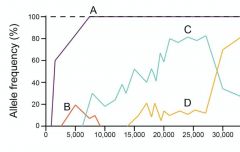Grade Level(s):
- 9-12
Source:
- BiteScis
Resource type:
- Classroom activity
Time: Two to three 50-minute class periods
Overview
In this reading-, writing-, and discussion-based activity, students explore bacterial evolution occurring in a stable environment, which counters the intuitive misconception that environmental change is a necessary component to natural selection. A landmark study provides the backdrop against which students can challenge their thinking about what it means for a population to evolve.

- [Mechanisms of evolution: Grades 9-12] Evolution occurs through multiple mechanisms.
- [Mechanisms of evolution: Grades 9-12] Evolution results from selection acting upon genetic variation within a population. (LS4.B)
- [Mechanisms of evolution: Grades 9-12] There is variation within a population. (LS3.B)
- [Mechanisms of evolution: Grades 9-12] Natural selection acts on the variation that exists in a population. (LS4.B, LS4.C)
- [Mechanisms of evolution: Grades 9-12] Inherited characteristics affect the likelihood of an organism's survival and reproduction. (LS4.B, LS4.C)
- [Mechanisms of evolution: Grades 9-12] Traits that confer an advantage may persist in the population and are called adaptations. (LS4.B, LS4.C)
- [Mechanisms of evolution: Grades 9-12] Natural selection is dependent on environmental conditions.
- [Mechanisms of evolution: Grades 9-12] Over time, the proportion of individuals with advantageous characteristics may increase due to their likelihood of surviving and reproducing. (LS4.B, LS4.C)
- [Mechanisms of evolution: Grades 9-12] The number of offspring that survive to reproduce successfully is limited by environmental factors. (LS4.B, LS4.C)
- [Mechanisms of evolution: Grades 9-12] Depending on environmental conditions, inherited characteristics may be advantageous, neutral, or detrimental.
- [Mechanisms of evolution: Grades 9-12] Environmental changes may provide opportunities that can influence natural selection. (LS4.B, LS4.C)
- [Mechanisms of evolution: Grades 9-12] Fitness is reproductive success — the number of viable offspring produced by an individual in comparison to other individuals in a population/species.
- [Studying evolution: Grades 9-12] Scientists use experimental evidence to study evolutionary processes.
- Disciplinary Core Idea LS3.B: Variation of Traits
- Disciplinary Core Idea LS4.B: Natural Selection
- Disciplinary Core Idea LS4.C: Adaptation
This lesson is meant to be used early in the evolution unit.
